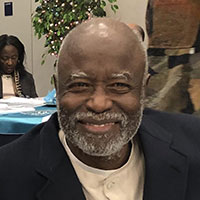Gillings School mourns loss of Dr. Bill Jenkins, advocate for minority health and witness against racism
February 19, 2019
William Carter (Bill) Jenkins, PhD, alumnus and adjunct professor of epidemiology at the UNC Gillings School of Global Public Health, died Feb. 17 in Charleston, S.C., at the age of 73. Throughout his life, Jenkins was a staunch advocate for minority health and witness against racism.
Jenkins’ passing was especially poignant for many at the Gillings School, given its proximity to the School’s 40th-anniversary Minority Health Conference on Feb. 22. Jenkins was a founder of the conference, an occasional speaker and a decades-long attendee and supporter.
Before returning to UNC-Chapel Hill, where he co-taught a spring seminar course from 2014 to 2017, Jenkins was professor of public health sciences at Morehouse College and associate director of Morehouse’s Research Center on Health Disparities. There, he instructed graduate and undergraduate students in biostatistics, epidemiology and public health; consulted on the development of public health programs at other historically black colleges and universities; and worked in community-based participatory research.
He previously had founded Morehouse College’s Public Health Sciences Institute which, together with another program he founded, Project IMHOTEP, has been a source for recruiting underrepresented minorities to the public health profession.
Jenkins began his career in 1967 as one of the first African-Americans to join the Public Health Service Commissioned Corps. He served as a statistician in the National Center of Health Statistics and then become its first Equal Employment Opportunity Officer.
Beginning in 1980, Jenkins worked with the Centers for Disease Control and Prevention (CDC) National Center for HIV, STD and TB Prevention, as a statistician, chief of the research and evaluation statistics section, supervisory epidemiologist and manager of the center’s Minority Health Activities Program. He also managed the Participant Health Benefits Program, which assured medical services to the survivors of the Tuskegee Study of Untreated Syphilis in the Negro Male. In 1997, Jenkins helped to obtain a presidential apology for the study and, in 2002, produced a documentary video with study survivors.
After earning a bachelor’s degree in mathematics from Morehouse College, Jenkins was awarded a master’s degree in biostatistics from Georgetown University and Master of Public Health and doctoral degrees in epidemiology from the UNC Gillings School. He completed postdoctoral work in biostatistics at Harvard T.H. Chan School of Public Health.
Jenkins was a fellow in the American College of Epidemiology, where he was elected to the board of directors and chaired the minority affairs committee. He was active in the American Statistical Association and chaired its epidemiology section. He was involved in the American Public Health Association (APHA), serving on the governing council and executive board.
In 1991, he and a group of other African-American epidemiologists and statisticians, many from the CDC, founded the Society for the Analysis of African-American Public Health Issues (SAAPHI), an APHA-affiliated organization that became instrumental in placing on the national public health agenda the goal of eliminating health disparities and racism.
Jenkins worked effectively to counter the concept that “race” was a biological phenomenon in humans, arguing that racism and culture were key determinants of health inequity. Personally warm and professionally vigilant, he is remembered as a campaigner for social justice, a champion for community-based participatory research, and a highly effective recruiter and mentor for public health students.
“For many years, Bill avoided the limelight, preferring to work behind the scenes,” recalled Victor Schoenbach, PhD, associate professor emeritus of epidemiology at the Gillings School and Jenkins’s longtime colleague and friend. “His extensive knowledge of African-American history, considerable experience in activism and keen observation of organizational processes made him a highly effective strategic thinker and doer. The more one looks, the more Bill’s fingerprints show up on significant organizational advances in health equity.”
Schoenbach worked with Jenkins in the American College of Epidemiology and SAAPHI, co-taught the seminar course at the Gillings School and co-authored a chapter for a forthcoming APHA Press publication on racism.
Jenkins is survived by his wife, Diane Rowley, MD, MPH, professor emerita of the Practice of Public Health at the Gillings School, and a daughter, Danielle Rowley-Jenkins.
Memorial arrangements will be described here as they become available.
To learn more about Jenkins, see a list of resources compiled by Dr. Victor Schoenbach at go.unc.edu/billjenkins.
Contact the Gillings School of Global Public Health communications team at sphcomm@listserv.unc.edu.

